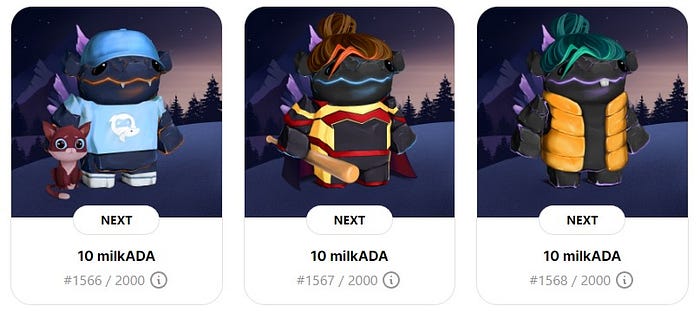Written interviews with NFT projects on the Cardano blockchain
Link to the interview on my Medium
This week’s guest on the Cardano NFT column is a company whose mission is to move the blockchain gaming industry from centralized Web2.5 gaming, to a new era of Trustless Web3 Gaming: Paima Studios.
The previous guest was an NFT project building a Play to Earn (P2E) Idle Heroes Game that is being developed by a team from Latvia.
This initiative is a point of reference for NFTs on Cardano and every week or two we will invite someone to answer some questions and give us an update directly from within the Cardano community.

Paima Studios is developing a Layer 2 Game Engine
Hey, glad to have you here. Please introduce your team, where are you from?
Hello, my name is Sebastien Guillemot and I’m one of the co-founders of Paima Studios. Along with Robert Kornacki and Nicolas Arqueros, we not only co-founded Paima Studios, but also co-founded dcSpark and Milkomeda as well.
Paima Studios itself has a relatively small team which spread across the world and we all work remotely, but I’m based in Japan where I’ve lived for 5 years.
What is Paima Studios? What problems are you solving and why Cardano?
Web3 games is a popular topic at the moment — especially as many NFT projects want to expand their brand into gaming. However, historically building a web3 game was not only very difficult, but also very risky as a single hack may destroy your brand.
Paima’s Web3 Engine solves these key issues by allowing developers to create onchain Web3 games using web2 skills such as Javascript, Unity, Game Maker and more. For the technically curious, this is done by turning the user’s game into an app-specific L2. Not only does this bring down the barrier to entry by allowing onchain games to be written in days instead of months, games written with Paima Engine are non-custodial by default — meaning you don’t need all your funds to be held in the game’s smart contract to play. This means that even if the game gets hacked, user funds are not at risk.
Games are an interesting industry because their success depends on attracting a broad passionate set of players instead of DeFi which tends to require large liquidity providers to succeed. The Cardano Community is well known across the industry for being broad and passionate, making it a natural fit for the Web3 gaming market.

Jungle Wars is a casual PvP game which acts as a first proof-of-concept of the tech
Layer 2 solutions have gotten a bad reputation in the crypto space due to hacks and centralization. How are you addressing this with your L2 Game Engine?
Games written with Paima Engine are, by default, fully decentralized. As a layer 2, not only do they inherit the underlying safety properties of the L1 protocol, games in Paima also do not need a sequencer to run.
This means that not only is there no point of centralization in the operation of the game, the fact that Paima is a non-custodial L2 also means there is no single smart contract that holds custody of user funds either, making games in Paima as decentralized as they could possibly be.
That being said, although the default of Paima is creating these decentralized experiences, every games and application created using Paima Engine is its own independent layer 2 and so (just like everything else in the web3 space) it’s up to players to know what they’re interacting with and understand if a game deviated from the default experience.
You’re integrating Stateful NFTs. What are they? What use cases do they allow?
A key to building a popular online game is to have frequent updates. It keeps your community engaged and allows you to quickly adapt to user feedback. However, historically many Web3 games are not able to do this due to over-committing to an initial idea by minting thousands of NFTs for their games to represent various components of the game experience (often before the game development has even started).
To allow for this quick iteration, Paima supports Stateful NFTs — NFTs whose state is automatically synchronized with the L2. This empowers game developers to simply update their game (aka update their L2) as frequently as needed and do so without introducing significant risk thanks to the non-custodial nature of games powered by the Paima Engine.

The Paima Volcaneers are the very first Stateful NFT collection to ever be released
Thank you for your contribution. Any final thoughts? Where can people stay in touch?
We launched the developer preview of the Paima Engine last week (at time of writing) and we’ve already gotten over 20 gaming projects sign up.
We’re always looking for new partners and new experiences though, so if anybody reading this is interested in building a game or application with Paima themselves (or if you know anybody who might be interested), definitely reach out!
You can contact us through our website.
Disclaimer: The opinions and views of the people interviewed are their own and do not necessarily reflect those of the Cardano Foundation or IOG. Moreover, this content is for educational purposes, it doesn’t constitute financial advice.